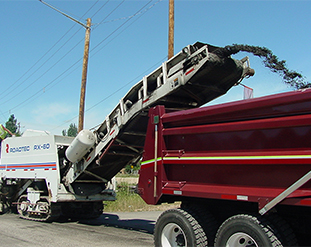
Asphalt is the pavement of choice for sustainability. It’s 100 percent reusable and recycled at a higher rate than any other material in America. In addition, asphalt pavements are able to use waste and byproducts from other industries — reducing environmental impacts.
Asphalt pavements also require less energy to produce than other paving materials, and their production emits fewer greenhouse gases than concrete pavements.
-
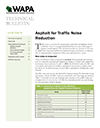
Asphalt for Traffic Noise Reduction
WAPA Technical Bulletin
Noise barrier walls are both expensive and ineffective for urban noise abatement, but asphalt—already the quiet pavement—can help reduce noise generated at the tire/pavement interface. This document describes how stone matrix asphalt and open-graded friction courses can be highly effective and cost-efficient noise abatement solutions. -
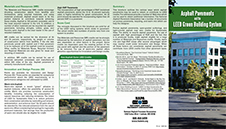
Asphalt Pavements and the LEED Green Building System
National Asphalt Pavement Association Brochure
This brochure outlines the various ways which asphalt pavements may be used to obtain or contribute to LEED credits. LEED Green Building Rating System is a benchmark or scorecard for the design, construction, and operation of green buildings. -
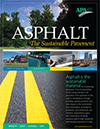
Asphalt: The Sustainable Pavement
Asphalt Pavement Alliance Brochure
Asphalt is the sustainable pavement for construction pavements. Low consumption of energy for production and construction, low emission of greenhouse gases, and conservation of natural resources help make asphalt the environmental pavement of choice. -

Black and Green: Sustainable Asphalt, Now and Tomorrow
National Asphalt Pavement Association Report
Research and field practices by the asphalt industry have constantly enhanced the viability of asphalt as an environmentally sound building material. -
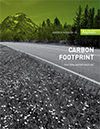
Carbon Footprint: How Does Asphalt Stack Up?
Asphalt Pavement Alliance Report
This paper examines greenhouse gas production of asphalt and concrete pavements. The analysis clearly shows that asphalt have a much lower carbon footprint that concrete. When it comes to pavements, asphalt is the more sustainable choice. -
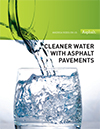
Cleaner Water with Asphalt Pavements
Asphalt Pavement Alliance Report
For improved stormwater management, clean drinking water, and reduced roadside pollution, asphalt pavements are clean and environmentally beneficial. -
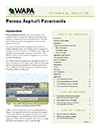
Porous Asphalt Pavements
WAPA Technical Bulletin
A detailed guide to the design, construction and maintenance of porous asphalt pavements. This document combines latest national best practices with Wisconsin-specific guidance and will be of value to pavement owners, designers and builders. -

Reclaimed and Recycled Asphalt: Where is the Payoff?
Equipment World Article
End users of reclaimed asphalt pavement (RAP) and recycled asphalt shingles (RAS) in asphalt mixes – both contractors and government agencies – are benefiting from the lower raw material prices that the bituminous and mineral reclaimed products bring to the table. Those components – which are 100 percent recyclable – replace virgin materials used in asphalt mixes, whether hot, warm or cold. -

Warm-Mix Asphalt: The Future of Asphalt
National Asphalt Pavement Association Report
Warm mix is an important step in sustainable development, simultaneously conserving natural resources, reducing the carbon footprint of the asphalt industry, and improving the quality of the pavements that Americans rely on.
